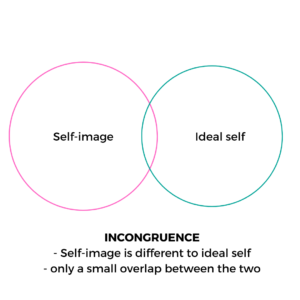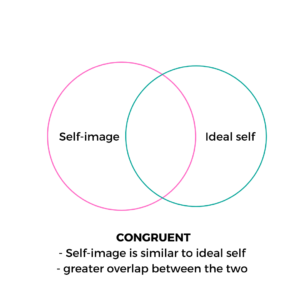How do I know who I am?
I frequently meet children, adolescents and the occasional adult (I focus my therapy and coaching work on young people) who will comment that they:
- Don’t know who they are
- Do not feel like themselves
- Feel like they do not fit in
I often explore the concept of congruence with them, as it is an important part of our identity. In fact, I was teaching congruence when I taught psychology in combined A-Levels as far back as 2005!
Congruence refers to whether our self-image of ourselves, matches with the actual experience that we have. The concept, dating back to Carl Rogers, a humanistic psychologist, explored that for a person to reach their potential, the conditions need to be right. He coined the term ‘self-concept’ in his work, as a way to describe ‘the organised consistent set of perceptions and beliefs about oneself’.

For a child or young person to have self-worth, their ideal self needs to be consistent with their life and experiences.
Conflict can occur in two ways:
- A child has a poor self-image but is performing well in life
- A child has a good self-image but is performing below their expectations in life
This creates INCONGRUENCE.
Ideally, our self-image and experiences should be similar in the majority. It is impossible for them to be identical, as we are always evolving as a human being.
This creates CONGRUENCE.

Congruence
When we achieve congruence:
- the higher sense of self-worth we have
- the more able we feel to reach our potential
- able to set goals and follow them through
- feelings and thoughts match words, actions and behaviours
Issues for young people
The challenges for young people, are that if they are in a state of incongruence, they:
- May use more defence mechanisms, like denial or experience depression to manage the gap
- May struggle to accept positive feedback or comments about their potential
- May find it difficult to express themselves
- May have found themselves taking part in activities or hobbies to please others, or meet their expectations
- May suffocate their true feelings, beliefs or desires as they are not in line with their beliefs about others perceptions
- May experience conflict in their understanding of what they are capable of
- May say they will do things but not follow them through
3 things we can do right now to support:
We can:
- Give children opportunities to explore their values, beliefs and feelings to develop self-awareness
- Offer children opportunities to use their voices, and encourage them to follow through with things that they desire
- Role model ensuring that our words and actions match, and that we follow through on promises
Want to learn more?
Are you looking for a deeper understanding of child mental health? Our Level 4 Child and Adolescent Mental Health Coaching Diploma takes you into an in depth dive of child mental health and how you can support children, teaching strategies, resources and activities to improve children’s well-being. You can join our Level 4 training (here).
© Dandelion Training and Development – All Rights Reserved
Further help
For more articles about mental health visit – ARTICLES
To learn more about child and adolescent mental health visit – COURSES
For resources to support child and adolescent mental health visit –RESOURCES

